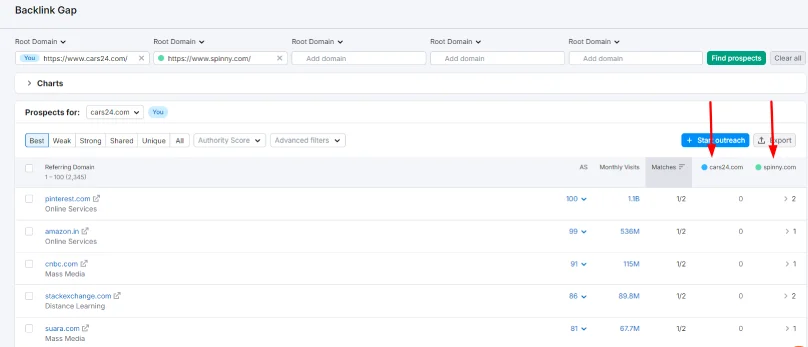
Working on SEO for a new industry can be exciting and a bit intimidating at the same time. But don’t worry—if you’re putting in the effort to learn and apply the right strategies, it will all be worth it in the end.
It offers unique opportunities for you to make a huge impact for your client.
In this blog, we will tell you everything you need to know about SEO for automobile brands.
Table of contents
- What is SEO for the Automobile Industry?
- The Importance of SEO for the Automotive Industry
- Different Businesses in the Automobile Industry and Their SEO Needs
- How to Approach SEO for Automobile Brands
- Conclusion
- Frequently Asked Questions
What is SEO for the Automobile Industry?
Automobile SEO refers to the strategic process of optimising your website so that it ranks higher in search engine results for keywords and queries relevant to your business.
With SEO for the automobile industry, you ensure that your website ranks high on search engines for relevant search queries like “best car dealer near me” or “buy car parts online.” Once your site starts ranking, you get more visibility, attract high-intent leads and ultimately drive conversions.
The Importance of SEO for the Automotive Industry
SEO for the automotive industry is critical because consumers increasingly turn to the internet before making purchase decisions. Whether someone is searching for a new car, researching a dealership or looking for parts and accessories, your brand needs to be visible when these users search.
Why SEO Matters:
- Organic Visibility: Most users start their research with search engines and SEO helps you rank for relevant terms like “buy a car in Ahmedabad” or “best car service in India.”
- Lead Generation: SEO doesn’t just drive traffic; it brings in high-intent leads who are already interested in buying.
- Cost-Effective Marketing: Unlike paid ads, SEO provides long-term results and a steady stream of traffic without the need for ongoing investment.
SEO isn’t solely about ranking. It also involves understanding consumer behaviour, which shifts constantly between research and purchase phases.
Let’s say you’re optimising an automobile dealership website in Ahmedabad. Keywords like “best car dealer in Ahmedabad,” “Ahmedabad car showroom,” and “test drive SUV Ahmedabad” could be your primary targets.
Different Businesses in the Automobile Industry and Their SEO Needs
The automobile industry is diverse and so are its SEO requirements. Different types of businesses need tailored SEO strategies. Let’s break them down:
Car Dealerships
These are the most common automotive businesses and they rely heavily on local SEO to attract customers in specific regions. For instance, if you’re optimising a dealership in Ahmedabad, you’ll want to focus on city-specific keywords. You can leverage Google My Business (GMB) and create separate landing pages for each location if the dealership operates in multiple cities.
Car Parts Retailers (e-commerce)
These businesses target a broader audience and need to focus on e-commerce SEO. Here, product page optimisation and long-tail keywords like “affordable car tyres online India” can drive significant traffic.
Car Repair and Services
For service providers, local SEO works wonders . People usually search for mechanics and repair shops in their vicinity, so optimising for “near me” searches and including structured data like opening hours and reviews will boost visibility.
Use geo-targeted keywords such as “car service near me” or “car repair in Ahmedabad” to capture local traffic.
How to Approach SEO for Automobile Brands
If your fundamentals are sorted, you can easily implement an SEO strategy for an automobile brand.
Here’s how to approach it.
1. Make Your Keyword Research More Strategic
The backbone of any SEO strategy is keyword research and for the automotive industry, this means targeting not just high-volume head terms, but also long-tail and transactional keywords.
Here’s how to get it right.
Understand User Intent
When performing keyword research, it’s crucial to understand the user’s search intent. Are they looking for information (“best SUVs 2024”) or are they ready to buy (“buy Honda Civic Ahmedabad”)?
Use tools like Semrush or Ahrefs to analyse competitors and find gaps in their strategy. Also, consider using Google Keyword Planner to discover location-based keyword opportunities.
Include Different Types of Keywords
You can use a mix of keywords to optimise your client’s website for SEO.
- Informational Keywords: For users in the research phase. E.g., “best cars for long drives.”
- Transactional Keywords: For users ready to convert. E.g., “buy Toyota Camry Ahmedabad.”
- Branded Keywords: For users looking for specific brands. E.g., “Maruti Suzuki showroom Ahmedabad.”
2. Optimise All The Elements of On-Page SEO
On-page SEO is where you fine-tune individual pages on your website to rank better. For the automobile industry, this involves optimising content, headers, meta tags and images in a way that resonates with both users and search engines.
a) Title Tags and Meta Descriptions
Write title tags that include relevant keywords, but make sure they are enticing enough for a click. Your meta descriptions should include a call to action (CTA) that encourages users to visit your website.
Example Title Tag
“Affordable SUVs in Ahmedabad | Book a Test Drive Today.”
Example Meta Description
“Explore the best deals on SUVs in Ahmedabad. Visit our showroom or book your test drive online now!”
b) Header Tags (H1, H2 to H6.):
Structure your pages with proper header tags. Use your primary keyword in the H1 and related keywords in H2s and H3s to maintain a semantic structure. This also helps with Google’s passage ranking algorithm.
c) Internal Linking:
Create a well-thought-out internal linking strategy to guide users through your website and ensure link equity is passed between pages. For an automotive site, linking from blog posts (e.g., “Best Cars for Families”) to service pages (e.g., “SUV Showroom”) is a good strategy.
d) Image Optimisation:
Images are crucial in the automotive industry, especially when showing off new car models or parts. Optimise images by:
- Compressing them for fast load times.
- Adding descriptive alt text with relevant keywords.
Here’s an example of a descriptive Alt Text — “New Honda Civic front view in Ahmedabad showroom.”
3. Earn Backlinks From Industry Specific Sites
In the automotive industry, off-page SEO is all about building backlinks from trusted sources, increasing your brand’s authority and credibility.
Focus on acquiring links from automotive-related websites, blogs and forums. Engage in guest posting on reputable sites like CarDekho or AutoCar India to get high-quality backlinks.
Use tools like Ahrefs & Semrush to check your backlink profile and identify opportunities to earn more links.

4. Combine SEO with Paid Ads
SEO takes time to show results, but pairing it with paid ads can give you an immediate boost. Here’s how to combine both strategies for maximum impact.
a) Bid on Your SEO Keywords:
If you’ve already done the heavy lifting with SEO, target the same keywords with Google Ads to appear in both organic and paid search results. This increases your chances of capturing high-intent users.
b) Remarketing Ads:
Use data from SEO to inform your paid campaigns. For example, if users frequently visit your website but don’t convert, you can target them with remarketing ads showcasing the models or services they viewed.
5. Measure KPIs To Refine Your Strategy
No SEO strategy is complete without measuring its success. Track these KPIs to ensure your SEO efforts are yielding results:
- Organic Traffic Growth
- Conversion Rate
- Bounce Rate
- Page Load Time
- Keyword Rankings
Use Google Analytics and Google Search Console to track these metrics regularly.
Conclusion
SEO for the automobile industry is all about understanding your audience, providing value at every stage of the buying process and optimising your site for a seamless user experience.
We hope that the strategies mentioned in this blog help you and set you up for success.
If you are still unclear, it is always a good idea to reach out to professionals working at an SEO company and ask for some advice.
Good Luck!



